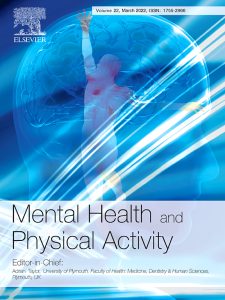A psychiatry journal, which began as a ‘passionate hobby’, for a Plymouth Professor now sits in the top 25% of Psychiatry journals globally.
 For more than 30 years Professor Adrian Taylor has developed and evaluated evidence-based interventions to help improve the lives of people living with chronic long-term conditions like depression, addiction, obesity and diabetes, focusing on supporting changes in physical activity through face-to-face counselling or on-line support. In 2008 he co-founded the journal, Mental Health and Physical Activity, creating an international forum to help advance understanding of the relationship between the two.
For more than 30 years Professor Adrian Taylor has developed and evaluated evidence-based interventions to help improve the lives of people living with chronic long-term conditions like depression, addiction, obesity and diabetes, focusing on supporting changes in physical activity through face-to-face counselling or on-line support. In 2008 he co-founded the journal, Mental Health and Physical Activity, creating an international forum to help advance understanding of the relationship between the two.
The journal started life in 2007 after Adrian attended the world’s first international conference on physical activity and mental health, in Dallas, Texas. The conference, which brought together a wide range of clinicians, laboratory-based and applied academics, and service users, demonstrated the need for a journal independent of academic or professional affiliation. Launched together with former Exeter University academic, Guy Faulkner, the journal initially received mixed reviews, ranging from, ‘it fills a gap in a rapidly expanding field’, to ‘no need for another journal’. Undeterred the colleagues published the first issue in 2008.
“. . . taking the time to support authors is helping to expand global interest and expertise, which makes me very proud.”
Adrian said: “The aim of Mental Health and Physical Activity is to foster an inter-disciplinary development and understanding of the mental health and physical activity field, develop research designs and methods and promote the publication of high-quality research on the effects of physical activity.”
Reflecting on the journal’s journey Adrian said: “I’m proud that since last year the journal has seen an increase in the Impact Factor from 3.1 to 5.95 and is now being ranked in the top quartile of over 150 ‘Psychiatry’ journals.”
“Research interventions developed in the South West have fed into local and global understanding of how best to promote physical activity for the benefit of well-being and mental health.”
When Guy stepped down as co-Editor in Chief, Adrian set up an editorial team of Associate Editors in the US, Australia, Ireland, Sweden and Italy, to work with over 30 editorial board members in 10 countries covering a wide range of research and clinical experience. Adrian said:
“COVID lockdown brought a surge in submissions from across the globe involving participants from across the life cycle, in clinical and community settings, with addictions, common and severe mental illness, cognitive decline and with low well-being affecting self-esteem and quality of life.”
Since he semi-retired 2 years ago Adrian has continued to make time to mentor the Editorial team and authors from across the globe in the hope of facilitating higher standards of transparency in research and addressing equality and diversity issues in the editorial team. He said:
“Over 60% of manuscripts had female first authors, but less than 40% of the editorial team were female, so we’ve worked hard to address this and now enjoy a very balanced proportional representation. Even though over 80% of journal submissions are rejected, taking the time to support authors is helping to expand global interest and expertise, which makes me very proud.”
In addition to fostering the reporting of high-quality research, the journal aims to ‘provide an evidence-based source for professionals working in the field of mental health and a forum to consider service delivery issues’. Content has included state of the art systematic reviews and original quantitative and qualitative research which, for example, has directly contributed to WHO physical activity guidelines and the development of a Canadian toolkit for health care professionals to support patients with low mood. Adrian said:
“Research interventions developed in the South West have fed into local and global understanding of how best to promote physical activity for the benefit of well-being and mental health, and how best to involve a wider range of participants in research. Bringing together researchers from very different backgrounds and expertise in an interdisciplinary forum has been one of the most impactful contributions of my 13 years as Editor-in-Chief.”
***
